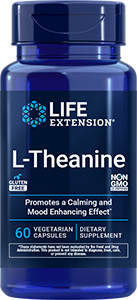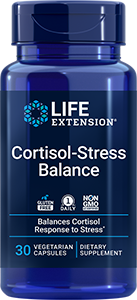
How to Maintain Normal Cortisol Levels
Published: June 2021
Cortisol is important for your body to function normally and respond to stress in a natural way, but high cortisol levels for extended periods of time can impact a healthy stress response. It is important to maintain already-healthy cortisol levels so that your body does not think it is constantly in a fight-or-flight situation. It's kind of like Goldilocks and the Three Bears—you don't want cortisol that's too high, or too low.
Your adrenal glands regularly secrete cortisol in fluctuating amounts throughout the day, but cortisol levels are secreted at a faster rate as a stress response or fear during your body's natural "fight or flight" reaction. When your body experiences a threat in your immediate environment, your internal systems start to prepare for you to either stay and face the problem head on or run to safety.
So perhaps you're wondering: "How can I maintain already-healthy cortisol levels?" These tips and tricks will help you to maintain already-normal cortisol levels, combat stress and maintain an overall sense of wellbeing.
DO: Take a cortisol stress test

First and foremost, if you're wondering about your cortisol levels, a cortisol test may be for you. This simple lab test measures your cortisol levels. Getting your cortisol levels tested can help detect the levels of cortisol in your pituitary and adrenal glands.
A cortisol test comes in different forms: blood, saliva or urine. Although each test is administered differently, they all evaluate the level of cortisol your adrenal gland produces. Your doctor can help guide you in making this decision.
DO: Reduce stressors in your life

If you're looking to maintain already-healthy cortisol levels, then you need to get to the root of the matter: stress. Stress takes different forms in our daily lives—conflicts or worries about work, finances, health and relationships all can take their toll on us. If you can eliminate stressors, do so! Cancel that expensive vacation that you're worried you can't afford to take; stop spending time with your toxic friend; find a better job so your micromanaging boss won't keep you up at night.
Of course, not every stressor can be eliminated—and in those cases, what you can control is your perspective. How we deal with life's challenges ultimately impacts overall well-being and a more positive outlook may even increase longevity.
Learn to recognize triggers that get you "worked up," and try to manage these feelings so they don't create feelings of worry or bodily tension. It may not be easy to self-identify these stressors, however. A mental health professional can help you pinpoint what pushes your buttons, and offer useful tools to handle stress when life throws hurdles your way.
DO: Eat a healthy diet

Often, when triggering that stress response, you tend to "eat your feelings." This can lead to overeating and having an appetite for unhealthy (and often sugary) substances that can impact your entire body.
Adhering to a healthy, well-balanced diet is key to maintaining already-healthy cortisol levels. A Mediterranean diet rich in lean protein and healthy fats, along with fresh fruits and vegetables, will provide the nutrition and energy your body and brain needs to properly function through each day.
Some foods that may help maintain your already-healthy cortisol levels include dark chocolate, bananas, pears, green tea, probiotic rich foods and fiber rich foods. Drinking eight 8 oz. glasses of water throughout the day is always good advice, but even better if your goal is to maintain already-healthy cortisol levels.
Explore Our Best Stress Management Supplements
DON’T: Stay up all night

If you enjoy being a night owl, your late-night habits may be doing more harm than good when it comes to your physical and mental health. Your cortisol levels are different depending on the time of day. In the morning, your cortisol levels are higher and at night your levels are at their lowest and this cortisol cycle repeats day after day.
If you aren't getting adequate sleep each night, then you aren't allowing your cortisol levels to regulate through their natural cycle, which may leave you working harder to maintain already-healthy cortisol levels all day and night.
It is important to stick to a sleep schedule and get the recommended eight hours so your body can properly rest and recharge. Do what you need to wind down before bed—take a bath, avoid caffeine, read, supplement with sleep enhancing nutrients and set up a quiet space for yourself to get a good night's rest.
The quantity of sleep you get is just as important as the quality of sleep you get.
DO: Exercise (but don’t overdo it!)

Exercise is one of the best and most natural ways to support a healthy stress response. Hitting the gym, running, swimming, biking or whatever makes you break a sweat does your body good. But, how and when you exercise is important, because, ironically, exercise itself is a form of stress on your body.
The time and intensity of exercise can affect the levels of cortisol that your adrenal gland produces. When breaking a sweat, it is important to listen to what your body needs—pushing yourself past the breaking point, or working out for more than an hour, can trigger excess cortisol. If you find yourself more revved up than relaxed post-workout, consider leaving your more intense training for later in the day, when your cortisol levels are naturally lower. Also be sure to fuel your body with enough protein, carbohydrates and fats so that hunger isn't causing stress to your body.
DON’T: Drink caffeine at night

If your goal is to maintain already-healthy cortisol levels, you'll need to kick the caffeine, especially in the evening. A cup of caffeinated coffee or tea can interfere with getting adequate rest.
DO: Take supplements that support healthy stress levels

When it comes to normal cortisol levels, lifestyle changes are a great way to support your adrenal gland, but several supplements for stress can take your self-care to another level. Look for formulas that support a healthy mood and ultimately support a healthy stress response.
- Ashwagandha is a powerful ancient plant, trusted for centuries and used in Ayurvedic regimens to help manage stress levels, maintain already-healthy cortisol levels and promote better mental health.
- If you are feeling blue, go green. The powerful and calming compound in green tea, L-theanine, provides the body with overall relaxation. This amino acid can be found in capsule form or when you brew up a cup of antioxidant-rich green tea.
- Valerian comes from a root and helps your GABA receptors better support stress levels—so you can stay calm and also get a restful night's sleep.
Stress support isn't just something you can swallow (or brew). Many people also turn to essential oils like lemon balm as part of their self-care routine. Lemon balm's pleasant aroma provides a calming sensation to your body's nervous system. Best of all, lemon balm is portable, making it the perfect companion for on-the-go stress support.
References
- Cassoobhoy, Arefa, MD, MPH. "What Is Cortisol?" WebMD, December 2020, https://www.webmd.com/a-to-z-guides/what-is-cortisol
- Hill, E E et al. "Exercise and circulating cortisol levels: the intensity threshold effect." J Endocrinol Invest., July 2008, https://pubmed.ncbi.nlm.nih.gov/18787373/
- Leffler, Samantha. "15 Easy Ways to Lower Cortisol Levels so You Don't Feel as Stressed." EatThis, March 2020, https://www.eatthis.com/lower-cortisol/
- Mayo Clinic Staff. "Chronic stress puts your health at risk." Mayo Clinic, March 2019, https://www.mayoclinic.org/healthy-lifestyle/stress-management/in-depth/stress/art-20046037
- Stibich, Mark, PhD. "Embrace Aging With Positive Thinking." Very Well Mind, February 2020, https://www.verywellmind.com/positive-thinking-and-aging-2224134





